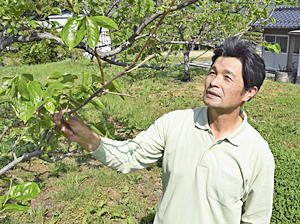Semi-dried persimmons up for export 1st time since 2011(「あんぽ柿」震災後初輸出)

The Fukushima prefectural government and the Japan Agricultural Cooperatives (JA) Group are set to export anpogaki semi-dried persimmons as early as this winter for the first time since the March 2011 accident at Tokyo Electric Power Company Holdings, Inc.'s Fukushima No. 1 nuclear power plant.
Thailand is seen as the first destination for resuming exports of anpogaki, a specialty of the northern part of Fukushima Prefecture. The prefectural government is making arrangements with Thai authorities to decide the specific timing and quantity of the exports. It aims to use exports to Thailand to build momentum for expanding overseas sales channels for the processed persimmons, as the Southeast Asian country is importing an increasing amount of agricultural products from Fukushima Prefecture.
県とJAグループは今冬にも、東京電力福島第1原発事故後初めて、県北地方の特産品・あんぽ柿を輸出する。最初の輸出先にタイを想定しており、当局と調整を進めている。具体的な輸出時期や数量は今後決定する。県は県産農産物の輸出が好調なタイを足掛かりに、海外で一層の販路拡大を目指す。
In 2015, the Thai government removed in principle all restrictions on importing agricultural and marine food and products from Japan, including those from Fukushima Prefecture. In a country whose per capita consumption of fruit is about double that of Japan, peaches, pears and apples are particularly popular among Fukushima produce. This is partly because products from Japan have become more popular as an increasing number of Thais travel to Japan.
The prefectural government is considering holding a tasting and sales event in Bangkok, while also launching promotional activities in collaboration with a local agent.
タイ政府は2015年、本県を含む日本産の農林水産物・食品に課していた輸入規制を原則撤廃した。タイは果物の消費量が日本の倍と多い上、訪日客の増加で日本産品の人気が高まっていることも追い風となり、県産のモモ、ナシ、リンゴなどが人気を博している。県はタイの首都バンコクであんぽ柿の試食販売会や、現地の販売事業者と連携したプロモーション活動の展開を検討している。
Anpogaki, said to have originated in the Yanagawa district of Date city in the northern part of the prefecture, have a jelly-like consistency because they contain more water than regular dried persimmons. The semi-dried products boast vivid orange -- rather than dark -- flesh, thanks to being fumigated with sulfur before being dried. Anpogaki are a local winter delicacy as they are processed and shipped from November to February.
あんぽ柿は、柿を干したドライフルーツで、伊達市梁川町で発祥したとされる。通常の干し柿より水分を多く含み、とろりとしたゼリーのような食感が特徴だ。硫黄でいぶしてから干すため実は黒くならず、鮮やかなオレンジ色に仕上がる。11月から2月ごろにかけて生産・出荷され、冬の風物詩として親しまれてきた本県の特産品だ。
However, the loss of water while drying reduces the fruit's weight, thus making it easier for anpogaki's concentration of radioactive cesium to exceed 100 becquerels per kilogram, the Japanese government-set maximum for food. When the prefectural government asked farmers mainly in Date and surrounding areas to refrain from processing persimmons in response to the nuclear accident, the move caused a nosedive in the shipping amount of anpogaki by limiting the production areas to other parts of the prefecture.
ただ、乾燥で水分が抜けるために放射性セシウムが濃縮し、食品の基準値(1キロ当たり100ベクレル)を超えやすいことから、県は原発事故後、主力産地の伊達市周辺などに加工の自粛を要請した。県内の産地は会津や県南などの一部に限られ、出荷量は激減した。
A conference for reviving anpogaki, which consists of the central and prefectural governments, municipalities and JA, among other entities, chose in fiscal 2013 pilot districts whose persimmons were found to contain lower amounts of cesium. Under the measure, these pilot districts resumed processing persimmons and shipped their anpogaki while screening all their finished products. The production amount of anpogaki increased year-on-year as more and more districts were designated under the pilot program. In fiscal 2018, the amount of anpogaki shipped through the prefectural headquarters of JA Zen-Noh, the business and marketing arm of JA, totaled 930 tons, about 75 percent of the predisaster level.
国や県、関係市町、JAなどでつくる「あんぽ柿復興協議会」は2013年度、柿の放射性セシウム濃度が低いモデル地区を選び、あんぽ柿の全量検査を取り入れて加工、出荷を再開した。モデル地区の段階的な拡大に伴い生産量は年々増え、全農県本部を通じたあんぽ柿の出荷量は昨年度、事故前の約75%に当たる930トンまで回復した。
Kazuo Hikichi, 61, an anpogaki producer in the Yanagawa district of Date, was delighted by the plan to export the product. "It's wonderful," he said. "It's a dream that my persimmons may be sold overseas."
The farmer hopes that the specialty's sales will be further expanded in the future. "As a dried product, anpogaki can last longer than regular fruits," he said. "We don't have to hold such delicious items back from the rest of the world."
( Translated by The Japan News )
伊達市梁川町のあんぽ柿生産者曳地一夫さん(61)は、あんぽ柿の輸出の方針に「素晴らしい。うちの柿が海外で売られるかもしれないなんて夢があるじゃないですか」と顔をほころばせた。曳地さんは「あんぽ柿はドライフルーツだから、普通の果物に比べて日持ちする」と指摘し、さらなる販路拡大にも期待。「輸出することで国内向けのPRにもなる」と話す。「こんなにおいしいものを世界に隠す必要はない」と自信をのぞかせる。
【 2019年5月17日付・福島民友新聞掲載 】
- Futaba Post Office reopens after 13 years(双葉郵便局、13年ぶりに再開)
- Craft sake brewery to make unmanned station more welcoming(無人駅の「クラフトサケ」醸造所がお出迎え)
- New Kitakata ramen developed to appeal to foreign tourists(訪日客向けの喜多方ラーメン開発)
- Aizu-Wakamatsu students come together with teahouse project(会津若松の生徒、茶室プロジェクトに集結)
- New hotel to be symbol of reconstruction(復興のシンボルとなる新ホテル)
- Radiation-resistant cameras to be produced in Fukushima(耐放射線カメラ、福島県で生産へ)
- International flights to Fukushima to resume after 13-year hiatus(福島の国際定期便、13年ぶり再開へ)
- Fukushima association to create base for parents of children with disabilities(障害児の親へ拠点作り)
- Real shell mound from Jomon period goes on display in Minami-Soma(南相馬で縄文のリアル貝塚展示)
- Japanese man opens restaurant to provide free meals to residents of war-hit Ukraine city(日本人男性が戦禍のウクライナに無料レストラン開店)